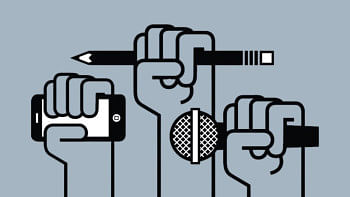The Culture of Piracy in Our Institutions

As students, we are repeatedly reminded to not plagiarise our work. We are asked to reference all concepts we utilize from any source we peruse, as we should. And therefore, it is clear that the concept of plagiarism, and the broader concept of intellectual property theft, is not one that our educators are unfamiliar with. However, somehow the systemic piracy that is sown into the very fabric of our institutions seems to be going thoroughly unaccounted for and unacknowledged. The constant piracy that is carried out in our schools and universities can be very easy to overlook, simply because of how acclimatised we are to it. Once you truly consider what's going on in our institutions, you should begin to see how abysmal it really is.
Pirated Books
University students may require over a hundred books throughout their schooling. For a student with limited finances, it is not feasible to buy the original and extremely expensive version of every book required for every course, especially since that book will probably only come in handy for that one course. However, does that make it alright to download pirated PDFs of said books online? Furthermore, does that justify a professor linking you to the websites where you can download the book from? In some cases, pirated photocopied versions of books are even sold inside university premises by stores sanctioned by the institutions themselves. It is uncertain whether a line ever existed in the first place, but at this point it seems to have been blurred beyond recognition. It is a university's responsibility to ensure that students do not have to resort to these measures. That is the entire point of a university library. The library should have enough copies of a book for students to not be inconvenienced. They can also licence digital copies of the book for students and offer them at subsidised prices. Most importantly, there should never be an incidence of lecturers helping students steal, instead encouraging them to use the proper channels of acquiring resources.
Pirated Research Materials
We are all familiarised to being asked to cite our references for all our work. However, the question of how we gained access to the papers we cite is one that is surreptitiously avoided. Do our teachers imagine for a second that we bought access to every paper we cite? They encourage us to cite papers from reputed journals, yet those are the ones that are the most difficult to get your hands on for free legally.
In one unfortunate case, I have personally been in a class where the professor linked us to a website that allows you to illegally gain access to locked papers right in the middle of class. For a minute, I stared in shock. When I looked around I was further appalled by the fact that no one else seemed to be disturbed by the idea at all.
Buying access to these papers by teachers or students is not what I am suggesting. However, the institutions we go to do not have the same financial restrictions faced by any single individual. They must be the ones who acquire these digital resources and provide access to their students, who pay hefty amounts for exactly these kinds of privileges.
Pirated Software
I saved the most preposterous form of piracy conducted by our institutions for last. This is the big one, the one we are so used to that it would probably seem unnatural for us to be doing it the right way: software piracy.
I would bet that the number of people in Bangladesh who use only legal software is smaller than the number of people who own *spends two hours looking for something suitably expensive and fails; use your imagination folks*. However, this article isn't about how everyone should be using licensed software. It's about holding institutions, who can easily afford such software, accountable for their misconduct. Almost all the labs in every institution across the country use pirated software. Be it English medium or Bangla medium schools, public or private universities, this is one of those problems that can be termed to be truly "non-partisan".
However, regardless of how prevalent it is, it cannot simply remain an accepted norm in Bangladesh. And the first people who need to begin using software legally must be our educational institutions with their centrally connected hub of computers.
The nonchalance with which institutions carry out systemic piracy is utterly alarming. It hints at the fact that casual piracy is not even believed to be wrong by most, which unfortunately includes people who head the administrations. Hiding behind the banners of being institutions in a "third world" nation, institutions that have more than enough resources to not have to resort to intellectual property theft do so without batting an eyelid. Before we begin to address how to fix what we are doing wrong, we must address whether we know what is wrong from right. And in this case, the latter seems to be a losing battle.
Rabita Saleh is a perfectionist/workaholic. Email feedback to this generally boring person at [email protected]

 For all latest news, follow The Daily Star's Google News channel.
For all latest news, follow The Daily Star's Google News channel. 



Comments